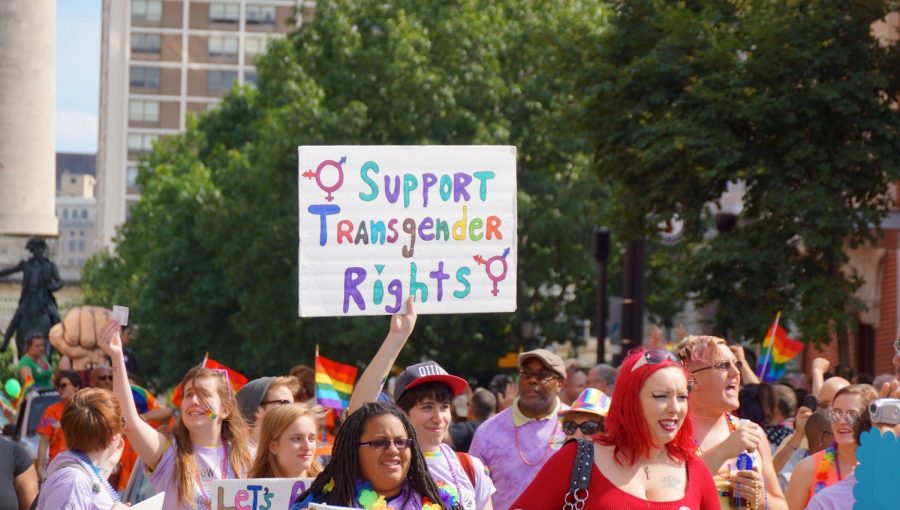Students Call for Reform For Transgender Awareness Week
November 29, 2018
November 12 marked the beginning of Transgender Awareness Week—a nationally observed week of love, support, and advocacy for transgender individuals and for visibility—which concluded with Transgender Day of Remembrance on November 20.
During this week, the need to support and understand trans individuals—people who are born in the wrong body, often struggle with body dysphoria and transition from male to female or female to male—became apparent, now more than ever.
Last month, the Trump Administration proposed a memo to crack down on trans rights, The New York Times reported. The proposal sought to officially redefine sex as either male or female and legally unchangeable. In reasoning behind this, Trump conveyed that the memo is “clarifying what it means to be a man or a woman, an immutable condition determined at birth by genitalia and biology,” and that any dispute would have to be settled with genetic testing.
Senior Jamie Yen, who shared that they openly identify as a transgender individual, explained that Trans Awareness Week serves to “remind the world” that trans people exist and “just happen to be stuck in the wrong body.”
Yen said they are confident in that “by existing,” they are “making everyone around [them] see that trans people are not monsters, that [they] are normal” and helping to fight stigma against trans individuals. People need to see that trans women are not are not just men in dresses, Yen said.
Similarly, senior Bailey McCoy shared that “in any chance” she gets, she tries to “advocate for trans individuals and educate others in the process.” As a part of the LGBTQ+ community, McCoy considers the trans community to be a close family.
Yen said such a law “would have no practical, direct effect on trans people” as they would “still be protected as humans under Title IX.” Yen called the Trump Administration’s memo “a passive aggressive slight that makes [their] intentions very clear, while doing little tangible harm to allow transphobes to blame [trans people] for overreacting.”
The National Center for Transgender Equality reported that the policy is intrusive and scientifically “doesn’t make any sense.”
Recently, CEO Jan Singer of Victoria’s Secret reportedly resigned from her position, according to the Wall Street Journal, after discriminating remarks revealed exclusion in the brand, advertisements, and models.
Senior Ollie Davis, who is non-binary, said that it is “absolutely disgusting that people believe it is okay to exclude and discriminate.” “If we don’t stand together and fight side by side for equality then what’s the point in any of this?” Davis asked.
McCoy explained that “in what should be such a progressive time, it is incredibly sad that big name brands can get away with making exclusive and overall hateful comments like that.”
Yen shared that some ways their peers can be more aware of trans rights and opportunities to help the trans community are by “calling a trans person by their preferred pronouns, making sure you are not outing them to someone that may hurt them, going clothes shopping with a trans friend that may feel self-conscious around people that may not see them as trans, and correcting the source of transphobia or ignorance when you see or hear it.”
Davis continued that “doing your research is extremely important and not making generalizations.”
Behind the scenes, violence against trans people is much more gruesome. The International Transgender Day of Remembrance recognizes trans lives that have been lost to fatal hate crime. Studies from the American Academy of Pediatrics showed that 41.8% of gender non-conforming individuals attempted suicide at some point in their lives while more than half of trans males and 29.9% of young trans women attempted suicide.
Yen shared that these teens attempt suicide “due to gender or body dysphoria” and are “subjected to hatred and violence just for existing.”
Reported from the Human Rights Campaign, studies showed that 2018 saw up to 21 transgender individual deaths and of those, 19 were minorities. McCoy detailed that “raising awareness for a marginalized group” is imperative to denouncing transphobia. She shared that trans people are “so dehumanized in a society that simply believes what they have heard and don’t give a second thought to it.”
Now that Transgender Awareness Week has passed, activists and student advocates still call for representation for trans individuals and reform against trans erasure.




